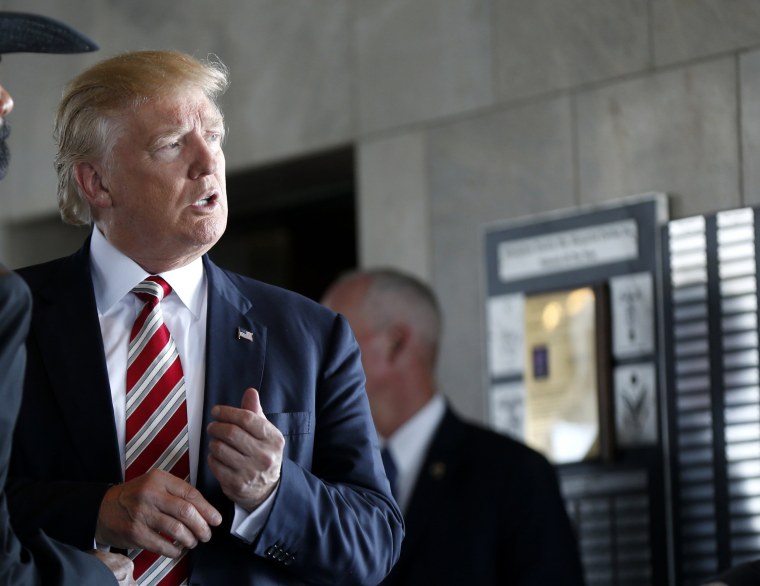Republican presidential nominee Donald Trump on Tuesday pledged to reject "bigotry and hatred and oppression in all its forms" — months after his slow response to the support of a former Ku Klux Klan leader and racially tinged comments about a judge's ethnicity generated controversy.
"I will fight to ensure that every American is treated equally, protected equally, and honored equally,” Trump said in a statement posted on Facebook. "We will reject bigotry and hatred and oppression in all its forms, and seek a new future built on our common culture and values as one American people."
Trump's statement came the same day that was campaigning in the Milwaukee area. The Wisconsin city has been the scene of violent street protests that erupted after police fatally shot a suspect who authorities said was armed.
Trump raised eyebrows in February where he initially declined to condemn former Ku Klux Klan "grand wizard" David Duke’s support of his campaign, saying in an interview on CNN that he didn’t have any knowledge of the man — a lie that Politifact gave a "Pants on Fire" rating.
Trump later disavowed Duke, and claimed a bad earpiece was to blame for his response.
Trump has been accused of stoking racial and xenophobic fears since he kicked off his campaign by accusing Mexico of sending "rapists" and other criminals to the U.S. and vowing to build a wall on the nation’s southern border.
And even before Trump's campaign began, he was widely seen as the face of the pseudo-racist "birther" movement, which erroneously claimed that the first black president of the United States wasn't actually born on American soil.
Trump has also been criticized for proposing to bar Muslims from entering the U.S. He has since shifted his position, and on Monday called for "extreme vetting" of those from territories with a history of terror.
Ahead of the Republican National Convention, self-described white nationalist William Johnson was chosen to attend as a Trump delegate. The Trump campaign said he was included in a delegate list by mistake. And the leader of a white nationalist group, Matthew Heimbach, was at a Trump rally in Louisville in March, where he was seen shoving a black protester.
The former reality TV star was also criticized in June after he accused a federal judge of bias in the Trump University case because of the judge’s "Mexican heritage" and the fact that Trump wants to build a wall on the southern border.
Even House Speaker Paul Ryan and other Republicans denounced Trump’s comments. "Claiming a person can't do their job because of their race is sort of like the textbook definition of a racist comment," Ryan said at the time.
Trump was again criticized after his campaign last month put out a Tweet calling Hillary Clinton corrupt that featured her face, a backdrop of $100 bills and a red star some said resembled a Star of David. The image was seen as anti-Semitic, and the campaign later changed it to a circle.
The image had originally been posted weeks earlier on a Twitter account devoted to bigoted memes.

